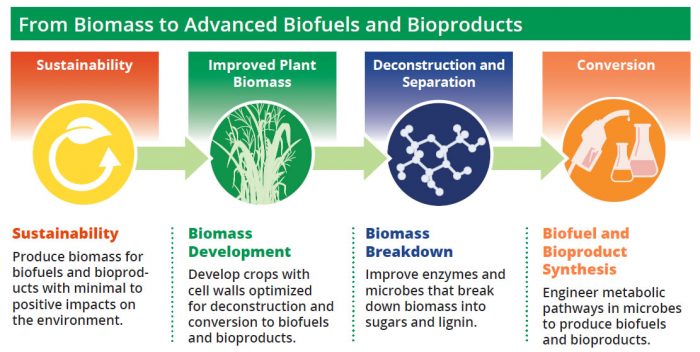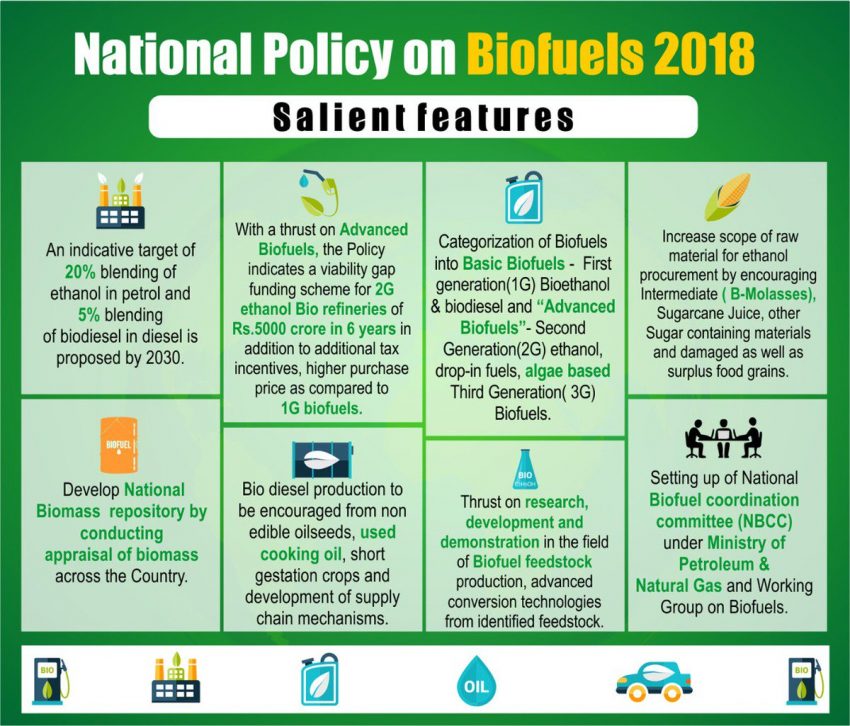Sustainable Alternative Towards Affordable Transportation Initiative 19/07/2019 – Posted in: Press Information Bureau – Tags: National Policy on Biofuels 2018
Sustainable Alternative Towards Affordable Transportation initiative
(Ministry of Petroleum and Natural Gas)
WHAT
Government is promoting the use of Compressed Bio Gas (CBG).
- It is used as an alternative green transport fuel for efficient management of biomass and organic waste.
- In this direction, Oil PSUs have launched ‘Sustainable Alternative Towards Affordable Transportation’ (SATAT) initiative in October 2018.
HIGHLIGHTS
- SATAT has the potential of addressing environmental problems arising from landfill emissions, farm stubble burning, etc.
- It will bring down dependency on oil/gas import.
BIOGAS
Biomass and organic waste sources like paddy straw, farm stubble, agricultural residue, cattle dung, sugarcane press mud, distillery spent wash, municipal solid waste, sewage treatment plants waste, etc. offer huge potential for biogas production.
Biogas is produced naturally through a process of anaerobic decomposition from waste / bio-mass sources.
COMPRESSED BIOGAS
- After purification of biogas, it is compressed and called Compressed Biogas (CBG).
- CBG has pure methane content of over 95%.
- CBG is exactly similar to the commercially available natural gas in its composition and energy potential.
- Compressed biogas has properties similar to CNG. It can be used as an alternative, renewable automotive fuel
BENEFITS OF CBG
- Responsible waste management, reduction in carbon emissions and pollution
- The additional revenue source for farmers
- Boost to entrepreneurship, rural economy and employment
- Support to national commitments in achieving climate change goals
- Reduction in import of natural gas and crude oil
- Buffer against crude oil/gas price fluctuations
WAY AHEAD
The Working Group on Biofuels, set up under the National Policy on Biofuels 2018, is in the process of finalising a pan-India pricing model for Compressed Bio-Gas.
It is planned to roll out 5,000 Compressed Bio-Gas plants across India in a phased manner, with 250 plants by the year 2020, 1,000 plants by 2022 and 5,000 plants by 2025.
These plants are expected to produce 15 million tonnes of CBG per annum, which is about 40% of current CNG consumption.
NATIONAL POLICY ON BIOFUELS
- The National Policy on Biofuels 2018 emphasizes the active promotion of advanced bio-fuels, including CBG.
- Earlier, a GOBAR-DHAN (Galvanising Organic Bio-Agro Resources) scheme had launched to convert cattle dung and solid waste in farms to CBG and compost.
- The program will be funded under Solid and Liquid Waste Management (SLWM) component of Swachh Bharat Mission-Gramin (SBM-G).
CATEGORIES OF BIOFUELS
- First Generation (1G) bioethanol & biodiesel
- Second Generation (2G) ethanol, Municipal Solid Waste (MSW)
- Third Generation (3G) biofuels, bio-CNG, etc.
Source: PIB
You can follow us on LinkedIn and on Instagram (Diligent IAS) for more updates related to IAS Preparation/ Study Material, Subscribe to our Facebook Page and Youtube Channel- Diligent IAS


